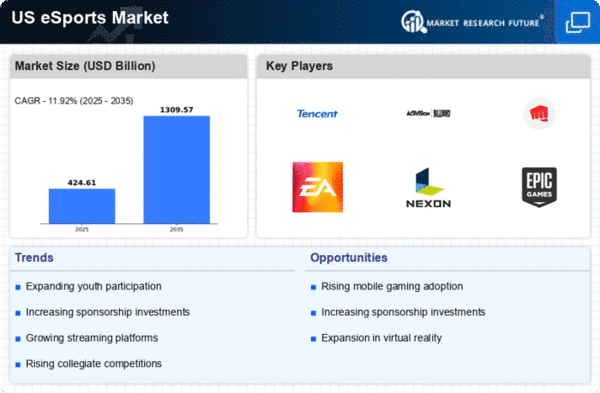Rise of Mobile Gaming
The rise of mobile gaming is significantly impacting the e sports market, as more players engage with competitive gaming through smartphones and tablets. Recent statistics indicate that mobile gaming accounts for over 50% of the total gaming revenue in the US, highlighting its importance in the overall market landscape. This shift towards mobile platforms is attracting a diverse audience, including those who may not have previously participated in traditional gaming. The accessibility of mobile games allows for a broader range of participants, which could lead to increased viewership and engagement in e sports events. As mobile gaming continues to grow, the e sports market may need to adapt its strategies to accommodate this expanding segment.
Growing Youth Engagement
The e sports market is experiencing a notable surge in youth engagement, with a significant portion of its audience comprising individuals aged 18 to 34. This demographic is increasingly drawn to competitive gaming, which is perceived as a modern form of entertainment. According to recent data, approximately 70% of e sports viewers in the US fall within this age range. This trend suggests that as younger generations continue to embrace digital platforms, the e sports market may see sustained growth. Furthermore, educational institutions are beginning to recognize the potential of e sports, with many colleges offering scholarships for competitive gaming. This growing acceptance within academic circles could further bolster participation and viewership, thereby enhancing the overall market landscape.
Technological Advancements in Gaming
Technological advancements are playing a crucial role in shaping the e sports market. Innovations in gaming hardware and software, such as high-performance graphics cards and virtual reality systems, are enhancing the overall gaming experience. These advancements not only attract more players but also elevate the quality of competitive gaming. The introduction of 5G technology is expected to further revolutionize the e sports market by enabling faster and more reliable internet connections, which are essential for online competitions. As technology continues to evolve, it is likely that the e sports market will see an influx of new games and formats, thereby broadening its appeal and potentially increasing its market share.
Expansion of Sponsorship Opportunities
The e sports market is witnessing an expansion in sponsorship opportunities, as brands increasingly recognize the potential of engaging with a young, tech-savvy audience. Major companies are investing heavily in e sports sponsorships, with expenditures reaching upwards of $1 billion in the US alone. This influx of capital not only supports teams and events but also enhances the visibility of brands within the gaming community. Sponsorship deals often include promotional activities, merchandise collaborations, and event activations, which can significantly elevate brand awareness. As more companies seek to align themselves with the e sports market, the competitive landscape is likely to evolve, creating new avenues for revenue generation and audience engagement.
Increased Media Coverage and Broadcasting
Increased media coverage and broadcasting of e sports events are contributing to the growth of the e sports market. Major networks and streaming platforms are dedicating resources to broadcast e sports competitions, thereby reaching wider audiences. This trend is evidenced by the fact that viewership for major tournaments has surged, with some events attracting millions of live viewers. The partnership between traditional media and e sports organizations is fostering a new era of visibility for competitive gaming. As more viewers tune in, the potential for advertising revenue and sponsorship deals increases, which could further enhance the financial viability of the e sports market. This growing media presence may also encourage new players to enter the competitive scene, thereby enriching the overall ecosystem.

















